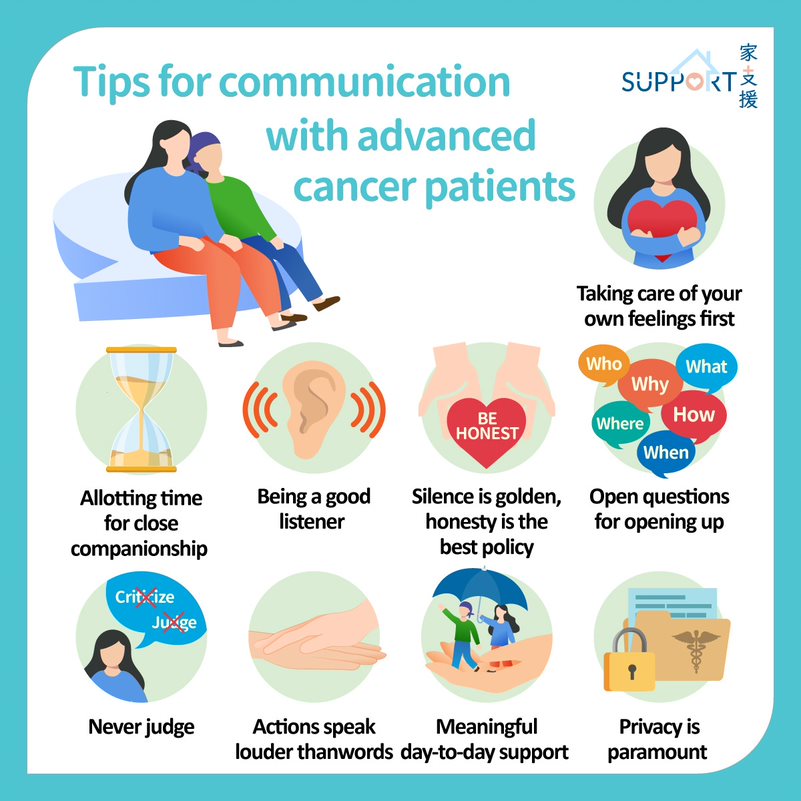Upon learning of a loved one’s illness, it is perfectly normal to want to care and help. However, there may be situations where you refrained from consoling them purely out of fear that you might say something wrong. Another scenario is not knowing what to say or having reservations of what is best to say to them.
Having a good set of communications skills is an important asset, especially when communicating closely with late-staged cancer patients. As they have different needs in terms of both physical and mental wellbeing, it is best to understand their ideas and feelings. Below are some suggestions on how you might want to communicate more effectively with your loved one as a carer or companion.
1. Taking care of your own feelings first
There are many things that may cause a carer to empathise with the patient. It could be sadness because of the patient’s suffering, stresses of day-to-day life or even guilt related to events that happened a long time ago. No matter the emotions you may have, it is important for you, as a carer, to always keep them under control. This is especially true if the patient takes their pent-up frustration out on you for whatever reason. This can wear you down over time, potentially causing apathy or even depression. Therefore, spending time regularly to give your mind and body the space it needs enables you to better manage your emotions. For example, if you have been having a hard time at work or are experiencing souring relationships, all this emotional baggage would be harmful especially if this is not dealt with properly. A cup of your favourite beverage or listening to your favourite song beforehand may help calm you down to have an effective and calm conversation with the patient during your visit.
2. Allotting time for close companionship
Time is a valuable asset to the patient. Let them feel you have come to visit them for the sole reason of keeping them company and boosting their morale. A useful piece of advice is to keep the environment free of clutter and distractions such as phones, televisions or disturbances that can interrupt conversations.
3. Being a good listener
Listening is a portal to a better holistic understanding of the patient – especially true if you want to know how strong their emotions are and how well they react to hardship and suffering. By picking up even the most minute details as they speak, it will become obvious to them that you want to build up a solid rapport with them. Sometimes, this could mean a lot if you listen when they talk about their favorite topics. On many occasions, you may not need to give a verbal response – simply nodding your head can be a much better alternative. Hence the saying, “The most important thing about communication is to pick up what has yet to be said”.

4. Silence is golden, honesty is the best policy
It is absolutely normal that sometimes you may not know how to reply to a question or a statement. Good use of silence could very well be the best answer. Don’t feel awkward with being silent. Eye contact goes well with silence and signifies your understanding and willingness to interact. Occasionally, the patient may break the silence by speaking first.
When the patient appears unwilling to continue discussion of a topic, that is a warning to stop. Switching to a lighter topic or something more interesting to the patient could be all that is needed for a more pleasant atmosphere.
Should you be confronted with a question you do not know the answer to, being honest is the best way forward. Answering “I do not know the answer to this”, or “I do not know too much about it” would be much better than giving white lies. In turn, white lies only show you as being dishonest and insincere over time.
Furthermore, should the patient ask “why” questions frequently, it may only be that they want to vent their unhappiness out instead of wanting a reply. As always, you should show empathy and be a good listener.
5. Open questions for opening up
Open questions are preferred for effective conversations. They can encourage the patient to express their thoughts and feelings comfortably with surprising effectiveness. Some examples of conversation starters could be:
- “The going must be very tough. Could you tell me more?”
- “Could you tell me what happened at that moment?”
- “What was your immediate reaction/ feeling at that point?”
- “What are you concerned or worried about most?”
- “Although I may not know what best to say to you, I am happy you share with me.”
- “Is there anything you would like me to do for you?”
Letting the patient express themselves freely will certainly make them feel respected and trusted by you!
6. Never judge
You may not agree with what the patient says all the time. Remember not to make reckless judgments, assumptions, or criticisms. Try to support them quietly and give them all your patience. There are many times, when their mood fluctuates unpredictably - sometimes they are happy and sometimes sad. As a carer, you must be understanding and be empathetic. Try to understand the patient’s feelings from their side.
Below are some suggested responses, such as:
“This news is surely depressing for anyone hearing of it.”
“I feel as bad about this as yourself.”
“Does this news make you feel unsure what the next step is?”
7. Actions speak louder than words
Use frequent eye contact as a gesture of sincerity to respond to the patient's words. Eye contact can show your care and express your understanding.
Touching their hands or patting their shoulders appropriately, or even stroking their hair, can convey strong messages such as "I am here for you", "You will not be alone", "Let's face it together". Actions speak louder than words.
8. Meaningful day-to-day support
When communicating with the patient, make sure you know their actual needs for day-to-day life. Providing help would be greatly appreciated if you are fully capable of doing so. Here are some ways you may help:
- Accompanying them to follow-ups and treatment
- Preparing food
- Taking care of their children or elders
- Small aspects of life such as minor errands and groceries
Remember, if the patient expressly declines any part of your help, it is important their decision is fully respected.
9. Privacy is paramount
Unless the patient's permission is obtained, do not tell others about the patient's condition nor the content of the conversation. This should be done in the best interests of the patient's privacy. If anyone else asks, you can first thank the other party for their concern and indicate that you will convey their greetings and wishes to the patient.



